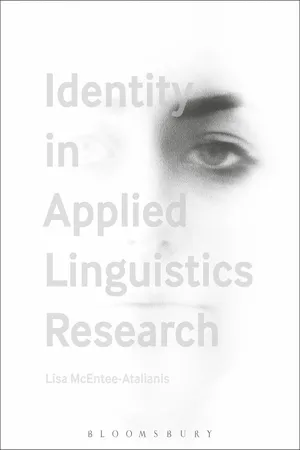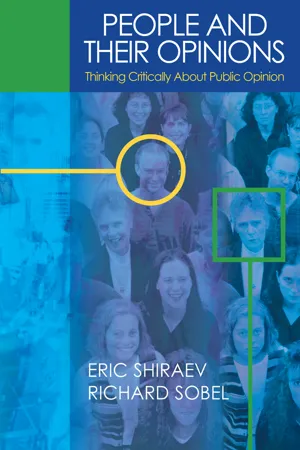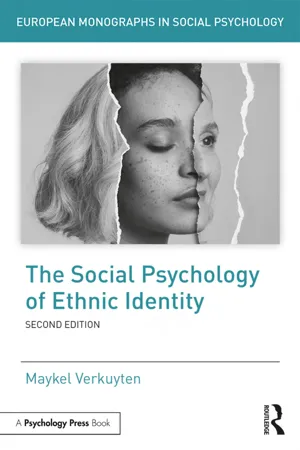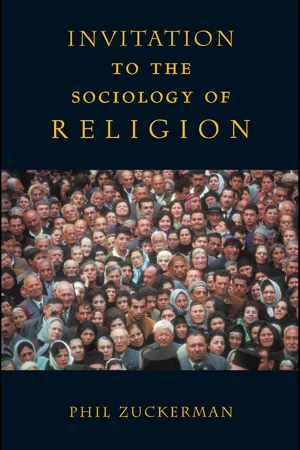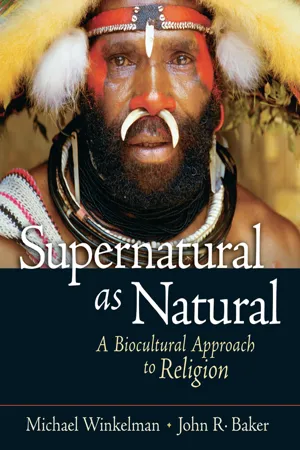Social Sciences
Ethnicity and Religion Sociology
Ethnicity and religion in sociology refer to the study of how cultural and religious beliefs and practices intersect with social structures and identities. This field explores how ethnicity and religion shape individuals' experiences, social interactions, and group dynamics within societies. Sociologists examine the impact of ethnicity and religion on social inequality, conflict, and cooperation.
Written by Perlego with AI-assistance
Related key terms
6 Key excerpts on "Ethnicity and Religion Sociology"
- eBook - ePub
- Lisa McEntee-Atalianis(Author)
- 2018(Publication Date)
- Bloomsbury Academic(Publisher)
CHAPTER EIGHT Ethnic and Religious IdentitiesIntroductionEthnic and religious identities concern where we come from and where we are going – our entire existence, not just the moment to moment. It is these identities above all that, for most people, give profound meaning to the ‘names’ we identify ourselves by, both as individuals and as groups. They supply the plot for the stories of our lives, singly and collectively, and are bound up with our deepest beliefs about life, the universe and everything.JOSEPH (2004: 172)Many studies have examined the relationship between ethnicity, language use and change, as well as the ways in which individuals’ ethnic identity/ies1 are constructed and negotiated in and through discourse. ‘Ethnicity’ is a contentious and elusive term with multiple definitions which often appeal to overlapping categories such as ‘race’, ‘nationality’ and ‘religion’ (Cohen 1999; Eriksen 2010). There is often difficulty in separating out such categories. Often religion and ethnicity intersect, each depending on the other, although there may be many different ethnicities observing the same religion. Many accounts of national identity also appeal to the category/ies of ethnic identity/ies (see Chapter Eleven ) although these often prioritize political autonomy and boundedness, rather than cultural heritage or common descent2 (Joseph 2004: 162). Moreover, many nations house different ethnic groups, while individuals sharing the same ethnicity can be spread across the globe, unbounded by national borders. Further, ‘race’ is sometimes used interchangeably with ethnicity, especially since its definition as a socially constructed category rather than a biological or genetic ‘given’ has become commonly accepted (Cokley 2007).3 - eBook - ePub
- Richard Sobel, Eric B. Shiraev(Authors)
- 2015(Publication Date)
- Routledge(Publisher)
Look around. Check opinion polls. Read newspapers. You do not have to be a professional to notice the obvious tendency of people to express opinions along the lines of their national, ethnic, racial, and religious groups. Why do these culture gaps in opinions occur? How substantial are such divisions?Looking Forward. Ethnicity, race, and religion, or culture, separately and together, affect people’s beliefs and attitudes. This chapter explores the diversity of opinions expressed by and about different racial, ethnic, and religious groups on issues and in voting. The theories of social power and prejudice help explain differences in political opinions and behaviors among groups.CULTURE: ETHNICITY, RACE, AND RELIGIONBefore we start our analysis, we should define culture. What is culture and what role do ethnicity, race, and religion play in an individual’s cultural identity? For the purposes of this textbook, we define culture as a set of attitudes, behaviors, and symbols generally shared by a large group of people and communicated from one generation to the next (Shiraev & Levy, 2004). No society is culturally homogeneous. No two cultures are entirely similar, and no two are entirely different. One cultural cluster can comprise significant variations and dissimilarities.Take, for example, the term commonly used for European countries, the United States, Canada, and English-speaking Australia and New Zealand: Western culture. This group of countries may represent one cultural cluster; however, each of these countries is diverse and stratified. Furthermore, some Western countries are more diverse than others, while others achieve relative equality. Use the term culture cautiously, recognizing that whenever you do, you describe general patterns. People who belong to the same culture do not necessarily have identical traits and opinions.Cultures are created by people, and people tend to identify with particular cultures. Race, ethnicity, and nationality, among other characteristics, are recognizable variables or components of cultural identification. What meaning do people attach to the words race, ethnicity , and nationality? - eBook - ePub
- Maykel Verkuyten(Author)
- 2018(Publication Date)
- Routledge(Publisher)
The various connections between ethnicity and religion does not mean, of course, that we can equate both constructs and that the use of the one or the other is sufficient analytically. There are many ethnic and cultural differences between all sorts of Muslims, Christians, Buddhists and Hindus. And people of the same ethnic group can differ in their specific religion, such as Catholic and Protestant Dutch or Germans. Moreover, membership of a religion is typically not based on a rule of descent, and when it is, we start to think about that group in ethnic terms. Gil-White (2005) discusses the case of Jews and the fact that a child of a Jewish mother is considered Jewish even if agnostic or atheist and not following any of the traditions: ‘Being a Jew is an immutable biological and social fact, ascribed at birth like sex and eye color. It may or may not include belief in Jewish religion, but being a Jewish atheist is not considered a contradictory in terms’ (Markowitz, quoted in Gil-White, 2005, p. 246). In contrast, when an Irishman coverts to Judaism, he might be considered a Jew (or rather an Irishman converted to Judaism), but when, after a time, he becomes an atheist, he is no longer considered a Jew. This example makes clear what the conditions for ethnicity are held to be (ancestry) and that religion can be related to ethnicity in various ways.p.51 NationhoodMany anthropologists analyse ethnicity and nationhood in similar terms and in close relation to each other. In doing so, they often make a distinction between state and nation. The former aspect refers to a political status that grants someone the legal status of citizen, with the related rights and duties. The latter refers to the status of national as one’s place in an affective community. In practice, these two elements of the term ‘nation-state’ are often conflated, but the implied equivalence is, for example, challenged by international migration. Naturalization policies turn immigrants into citizens, but that does not have to make them nationals, and dual citizenship can raise doubts about national commitment and loyalty. Furthermore, not making a distinction means that it becomes impossible to analyse situations of proto-nationalism (or ‘stateless nations’) in which ethnicity is the locus of political activity for gaining independence and autonomy, such as among the Catalans in Spain, Kurds in Turkey and Syria (Kurdistan), and the Scots in the United Kingdom. Ethnic nationalists believe that their ethnic community should be a political sovereign and unified unit with its own territory.8 - eBook - ePub
- Phil Zuckerman(Author)
- 2010(Publication Date)
- Routledge(Publisher)
To put it simply, an individual can be a member of a particular religion only if that religion exists when he or she does. Furthermore, geography (where a person exists) is key (Park 1994). An individual born in Sri Lanka is much more likely to be Buddhist than an individual born in Honduras, who will most likely be Catholic (O’Brien and Palmer 1993). My friend Kent describes himself as “nothing” in terms of a religious identity. But he isn’t “nothing” in a sociohistorical vacuum. His parents were also “nothing”; they didn’t raise Kent with any particular religious education or involvement. Furthermore, Kent grew up in a largely secular enclave and attended school in west Los Angeles with few overtly religious kids or teachers. Additionally, Kent lives in a time in history and within a culture in which religion isn’t imperative, lack of religion isn’t illegal or suspect, and being “nothing” is considered quite normal. In short, an individual’s personal religious identity (or lack thereof) is greatly influenced by where, when, and among whom that individual lives.6. Sociologists are interested in the ways in which individuals are shaped and influenced by their social environment .
Of the many components of the social environment that are important in shaping and influencing how individuals live their lives, religion is certainly crucial. Religious values, religious norms—in short, religious culture—greatly affect how people understand themselves and others. Sociologists are fascinated by the affects of religion on people’s sex lives, political views, national identities, economic activities, eating habits, career choices, marital relations, and, conversely, how such things affect people’s religious identities.7. Sociologists are fascinated by deviance, nonconformity, and the ways in which people resist or change the social forces that surround them .
The most dramatic role that deviance plays in the realm of religion is the development of new religious traditions. After all, every new religious movement ever established was created through deviance; some individual or group of individuals decided to go against the norm, to rebel against the established order, to defy the authorities, and even the law. Paul, Muhammad, Siddhartha, Guru Nanak, Vardhamana Mahavira, Baha’Allah, Martin Luther, Joseph Smith—all were religious deviants who, rather than passively accept and internalize the religious life around them, broke free and successfully acted against the prevailing religious system to create something new. - eBook - ePub
- Sinisa Malesevic(Author)
- 2004(Publication Date)
- SAGE Publications Ltd(Publisher)
Since Georg Simmel’s theories are much more micro sociological than those of Marx and Durkheim, one would expect a more explicit engagement with ethnicity and ethnic group relationships in his work. However, although Simmel does indeed provide a more comprehensive theory of ethnicity, the main propositions of this theory are, as with Marx and Durkheim, seldom directly spelled out and are, rather, ingrained in his general theories of social interaction. It is only in his classic ‘Stranger’ and, to a lesser extent, in ‘The Web of Group Affiliations’ and ‘On Social Differentiation’ that Simmel specifically discusses the nature of individual and group cultural difference. Simmel’s theory of ethnic relations is focused on three thematic blocks- ethnicity as a form of sociation
- the nature of social (and thus ethnic) interaction
- the decline of ethnicity through social differentiation.
Most of Simmel’s work concentrates on the analysis of the societal micro cosmos, and he sees sociology as a study of the forms of sociation. Sociation is defined as ‘the form (realised in innumerably different ways) in which individuals grow together into a unity and within which their interests are realised’ (Simmel, 1971: 24). Simmel makes a distinction between form and content, where content refers to concrete individual psychological or biological qualities which require and eventually lead to social action, while form is a generalized pattern of interaction, in the course of which individuals truly become social beings. Thus sociation is a dialectical and open-ended process through which individual interests or drives are transformed into integrated and socially meaningful collective entities and actions. A form is a general configuration of social interaction abstracted from a number of particular contents. Following this distinction ethnicity would thus be a form of sociation induced from the more particular contents of individual cultural difference. Ethnicity is a general name for a multiplicity of specific modes of individual and group interaction on the basis of a cultural variation. Ethnic relations not only always involve a degree of ambiguity and individual and group ‘nervousness’,5 but they are actually built around these dialectical and wavering poles of interaction.In Simmel’s analysis of the ‘stranger’ one can observe these contradictory processes at play. The stranger is both near and far in the group but never a full member of it; he is a ‘person who comes today and stays tomorrow’, somebody who is defined by his potential mobility, his freedom to be detached from the group’s destiny. He is a ‘potential wanderer’ but what really determines his position is ‘the fact that he has not belonged to it [the group] from the beginning’ and that ‘He imports qualities into it [the group], which do not and cannot stem from the group itself’ (Simmel, 1996: 37–8). The stranger has no organic or kinship connection to the group; he is not an ‘owner of soil’ and, as such, his presence is crucial to determine who ‘we’ in the group are. The presence of the stranger and the cultural difference that he represents sets the boundaries of the group’s norms and values. In other words, ethnicity acquires its full sociological meaning only when directly confronted with the alternative forms of cultural organization of social life. In this respect ‘the other’ is perceived in much more abstract and generalized terms than any individual member of ‘our’ ethnic community: ‘with the stranger one has only certain more general - eBook - ePub
Supernatural as Natural
A Biocultural Approach to Religion
- Michael Winkelman, John R. Baker(Authors)
- 2015(Publication Date)
- Routledge(Publisher)
The structural–functional approach of Evans-Pritchard does not fully embrace Durkheim’s view that religion is defined by the sacred, nor does it completely reject the intellectualist view that religion is a belief in supernatural beings. His work shows how religious beliefs are related to the structures of society. He argues that this is the influence of social structure on religion, rather than a social determination of the beliefs and ideas regarding spirits.Religion as a Cultural System
In his classic article “Religion as a Cultural System,” Clifford Geertz (1966) integrates the intellectualist concern over the explanatory role of religion with the functionalist perspective. In doing so, Geertz provides a broad and all-encompassing definition of religion that incorporated the intellectual, emotional, symbolic, and social aspects of religion as part of the total world-view of a culture. Geertz’s definition, which has resonated with many anthropologists, sees religion as “(1) a system of symbols which acts to (2) establish powerful, persuasive, and long-lasting moods and motivations in men by (3) formulating conceptions of a general order of existence and (4) clothing these conceptions with such an aura of actuality that (5) the moods and motivations seem uniquely realistic” (Geertz 1966).A key aspect of Geertz’s conception of religion is its role as a symbol system—a system of interconnected meanings that function to express the essence of a culture’s worldview and ethos, encompassing such diverse domains as morals, character, values, aesthetics, and cosmology. The principal function of religion is to illustrate the conformance between everyday life and the ideal view of the Universe that is depicted in a culture’s cosmology. Religious rituals provide mechanisms to make this connection emotionally convincing, giving people a certainty that the general principles in which they believe actually operate in the Universe. Religion projects a cosmic order that serves as a general model of the Universe, and then socializes human beings to help to ensure that people’s morals, emotions, and judgments conform to these ideals.Symbol System
Learn about this page
Index pages curate the most relevant extracts from our library of academic textbooks. They’ve been created using an in-house natural language model (NLM), each adding context and meaning to key research topics.
